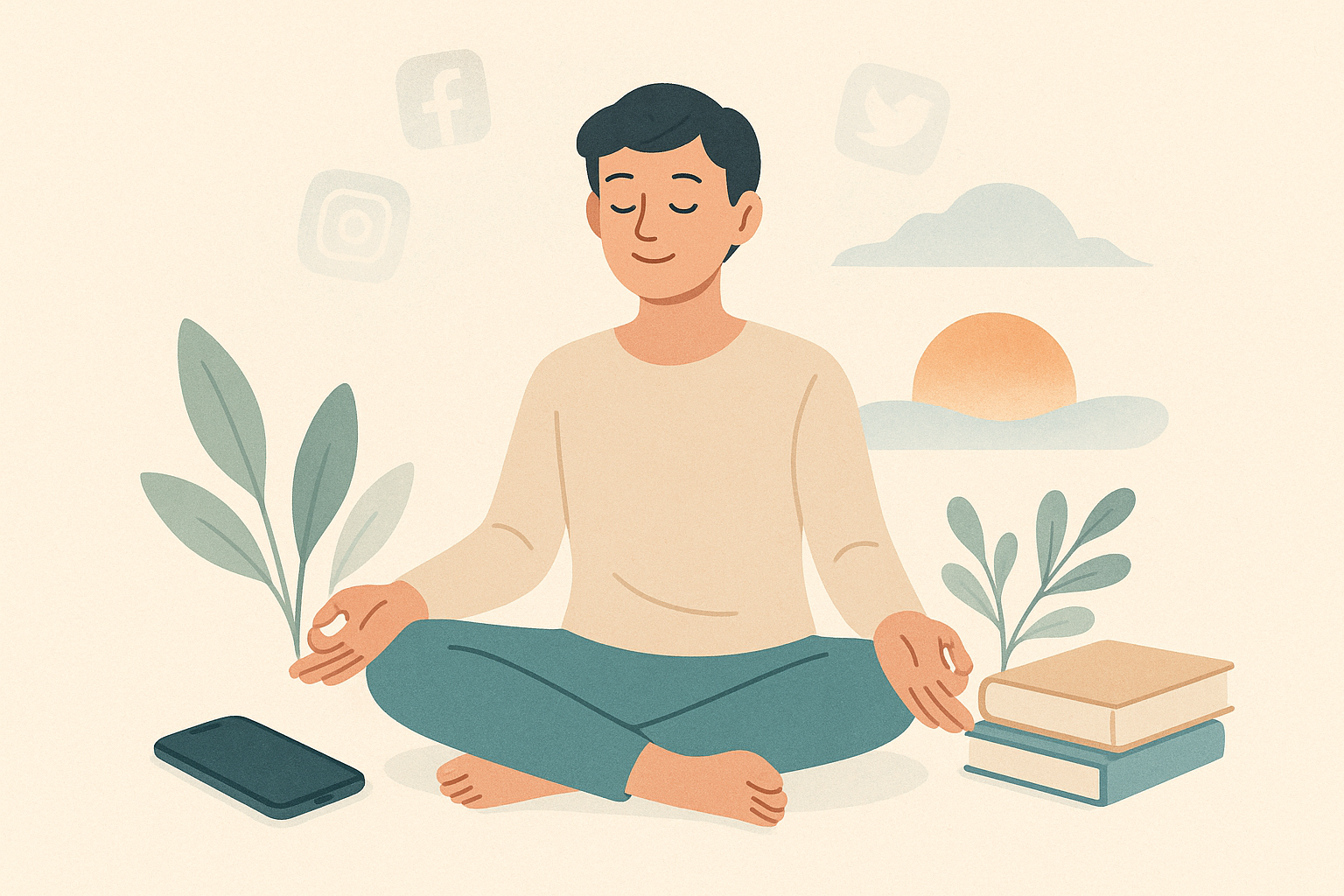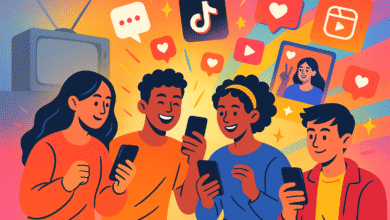Social Media Detox Benefits: Mental Health and Productivity
Discover proven social media detox benefits for mental health and productivity. Learn how digital breaks reduce anxiety, improve focus, and boost well-being.

Social media has become such a big part of our daily lives that many of us check our phones before we even get out of bed. While these platforms help us stay connected, they can also drain our mental energy and hurt our productivity. Taking a break from social media, known as a digital detox, can bring amazing benefits to both your mind and your work life.
A social media detox means stepping away from platforms like Facebook, Instagram, Twitter, TikTok, and others for a set period. This break can last anywhere from a few hours to several months, depending on your goals and needs. The social media detox benefits are real and backed by science, showing improvements in mental health, better sleep, increased productivity, and stronger real-world relationships.
EXPLORE THE CONTENTS
Why Social Media Affects Our Mental Health
Before diving into the social media detox benefits, it’s important to understand how these platforms impact our brains. Social media apps are designed to be addictive. They use psychology tricks like variable rewards and social validation to keep us scrolling. Every like, comment, or share triggers a small release of dopamine, the same chemical involved in addiction.
This constant stimulation can lead to several mental health issues. Many people experience anxiety when they can’t check their phones, a condition called nomophobia. Others develop depression from comparing their lives to the highlight reels they see online. The fear of missing out, or FOMO, also becomes stronger with heavy social media use.
Research shows that people who spend more than two hours daily on social media are more likely to report mental health problems. The constant stream of information and social comparison creates stress that our brains aren’t built to handle. This is where taking a digital break becomes so valuable.
Mental Health Benefits of Social Media Detox
Reduced Anxiety and Stress
One of the biggest social media detox benefits is lower anxiety levels. When you stop constantly checking for updates, your stress hormones like cortisol begin to normalize. Without the pressure to respond to messages immediately or keep up with everyone’s posts, your mind can finally relax.
Many people report feeling calmer within just a few days of starting their detox. The constant “ping” of notifications no longer controls their attention, allowing them to focus on the present moment. This reduction in digital noise helps create a more peaceful mental state.
Better Sleep Quality
Social media use, especially before bedtime, seriously disrupts sleep patterns. The blue light from screens interferes with melatonin production, making it harder to fall asleep. Additionally, scrolling through exciting or upsetting content right before bed keeps your mind active when it should be winding down.
During a social media detox, people often notice they fall asleep faster and sleep more deeply. Without the urge to check their phones late at night or first thing in the morning, they develop healthier sleep habits. Better sleep leads to improved mood, clearer thinking, and more energy throughout the day.
Improved Self-Esteem
Social comparison is one of the most damaging aspects of social media. When we constantly see others’ best moments, vacation photos, and success stories, it’s easy to feel like our own lives don’t measure up. This comparison trap can seriously hurt self-esteem and create feelings of inadequacy.
Taking a break from these platforms allows you to focus on your own journey without constant comparison. You start appreciating your real life instead of measuring it against filtered and curated online content. Many people discover that their self-worth improves significantly during a digital detox.
Decreased FOMO (Fear of Missing Out)
FOMO drives many people to check social media compulsively. The fear that something important or exciting is happening without them creates anxiety and restlessness. This fear often leads to mindless scrolling and wasted time.
During a social media detox, FOMO gradually fades as you realize that most online content isn’t actually important or relevant to your life. You learn to be content with your current activities and relationships instead of constantly seeking the next interesting thing online.
Productivity Benefits of Taking a Digital Break
Increased Focus and Concentration
Social media trains our brains to expect constant stimulation and quick rewards. This makes it much harder to focus on tasks that require sustained attention, like work projects, reading, or learning new skills. The average person checks their phone 96 times per day, creating frequent interruptions that destroy deep focus.
When you eliminate social media, your attention span gradually improves. Without the constant pull of notifications and the habit of checking your phone, you can concentrate on important tasks for longer periods. This improved focus leads to better work quality and faster completion of projects.
More Time for Important Activities
The average person spends over two hours daily on social media. During a detox, this time becomes available for activities that actually improve your life. You might read more books, exercise regularly, learn a new skill, or spend quality time with family and friends.
Many people are surprised by how much extra time they have when they’re not scrolling through feeds. This time can be invested in hobbies, career development, health improvement, or personal relationships – all of which provide more lasting satisfaction than social media browsing.
Better Time Management Skills
Social media use often happens without conscious decision-making. We pick up our phones intending to quickly check one thing and end up scrolling for an hour. This unconscious behavior makes it hard to manage time effectively.
A digital detox forces you to become more intentional about how you spend your time. You start making conscious choices about your activities instead of falling into the automatic pattern of reaching for your phone. These improved time management skills continue to benefit you even after the detox ends.
Enhanced Creativity
Constant consumption of other people’s content can stifle your own creativity. When your brain is always processing information from social media, it has less capacity for original thinking and creative problem-solving. The noise of endless content can drown out your own ideas and inspiration.
During a social media break, many people experience a boost in creativity. Without the constant input from others, your mind has space to generate its own ideas. You might find yourself coming up with solutions to problems, having new ideas for projects, or feeling inspired to try creative activities you haven’t done in years.
Physical Health Improvements
Reduced Eye Strain and Headaches
Staring at screens for hours each day causes significant eye strain, leading to headaches, dry eyes, and blurred vision. This condition, called digital eye strain or computer vision syndrome, affects millions of people who spend excessive time on digital devices.
Taking a break from social media naturally reduces screen time, giving your eyes a chance to rest and recover. Many people notice fewer headaches and less eye discomfort within days of starting their detox.
Better Posture and Reduced Neck Pain
“Text neck” has become a common problem as people spend hours looking down at their phones. This posture puts enormous strain on the neck and spine, leading to pain and long-term postural problems.
When you’re not constantly checking social media, you naturally spend less time in this harmful position. Your posture improves, and neck and shoulder pain often decreases significantly.
Increased Physical Activity
Social media use is inherently sedentary. The time spent scrolling could be used for physical activities like walking, exercising, playing sports, or even just moving around the house. A digital detox often leads to increased physical activity simply because you have more time and mental energy for movement.
Many people find themselves going for walks, trying new forms of exercise, or engaging in active hobbies they had abandoned. This increase in physical activity brings numerous health benefits, including better mood, improved cardiovascular health, and increased energy levels.
Improved Relationships and Social Connections
Deeper Face-to-Face Conversations
Social media can make us feel connected while actually making our relationships more superficial. We might know what hundreds of people had for breakfast, but struggle to have deep, meaningful conversations with close friends and family.
During a social media detox, people often rediscover the joy of real conversations. Without the distraction of phones, they can give their full attention to the people they’re with. These deeper connections are more satisfying and meaningful than the shallow interactions common on social platforms.
Stronger Family Bonds
Many families struggle with device distractions during meals and family time. When parents and children are constantly checking their phones, it becomes hard to build strong family relationships.
A family social media detox can dramatically improve household dynamics. Meals become opportunities for conversation, and family activities become more engaging when everyone is fully present. Children especially benefit from having parents who are not distracted by their devices.
More Authentic Relationships
Social media often encourages us to present a perfect version of ourselves, which can make relationships feel artificial. We might share our best moments while hiding our struggles, creating a disconnect between our online and real personalities.
Taking a break from these platforms allows you to be more authentic in your real-world relationships. You can share both your joys and challenges without worrying about how they’ll look online. This authenticity leads to deeper, more genuine connections with others.
Enhanced Self-Awareness and Personal Growth
Better Understanding of Your Habits
A digital detox forces you to confront your technology habits honestly. You become aware of how often you reach for your phone, what triggers your social media use, and how these platforms make you feel. This self-awareness is the first step toward making positive changes.
Many people discover that they were using social media to avoid boredom, anxiety, or difficult emotions. Understanding these patterns helps you develop healthier coping strategies and make more conscious choices about technology use.
Increased Mindfulness
Social media keeps us constantly focused on what others are doing, thinking, or feeling. This external focus can disconnect us from our own thoughts, emotions, and experiences. A digital detox encourages mindfulness by eliminating these external distractions.
Without the constant stream of other people’s content, you become more aware of your own thoughts and feelings. You might notice things about your environment, your relationships, or yourself that you had been too distracted to see before.
Also Read: How Social Media is Shaping Celebrity Culture in the UK
Greater Life Satisfaction
Research consistently shows that people who take regular breaks from social media report higher life satisfaction. They feel more content with their own lives and less envious of others. This satisfaction comes from focusing on real experiences rather than curated online content.
During a detox, many people rediscover activities and interests they had neglected. They remember what they actually enjoy doing rather than what looks good on social media. This reconnection with personal interests and values leads to greater overall happiness.
How to Start Your Social Media Detox
Set Clear Goals and Duration
Before starting your detox, decide what you want to achieve and how long you’ll stay away from social media. Your goals might include reducing anxiety, improving sleep, or increasing productivity. Having clear objectives helps you stay motivated when the urge to check your phone becomes strong.
Start with a manageable timeframe. A weekend detox is a good beginning for heavy users, while others might choose a week or a month. The key is choosing a duration that feels challenging but achievable.
Remove Apps and Create Barriers
Delete social media apps from your phone to remove the temptation of easy access. If you need these platforms for work, log out of your accounts and clear your browser’s saved passwords. Creating these small barriers gives you time to think before mindlessly opening social media.
You might also ask a trusted friend or family member to change your passwords temporarily, adding another layer of accountability to your detox.
Plan Alternative Activities
The urge to check social media often strikes during moments of boredom or transition. Plan specific activities to fill this time, such as reading, exercising, calling a friend, or pursuing a hobby. Having a ready list of alternatives makes it easier to resist the pull of social media.
Consider activities that provide similar rewards to social media, such as social interaction, learning, or entertainment, but in healthier forms.
Inform Your Network
Let friends and family know about your detox so they understand why you might be less responsive online. This reduces anxiety about missing important messages and helps your loved ones support your goals.
You might also ask friends to contact you directly via phone or text for urgent matters rather than through social media platforms.
Making the Benefits Last
Gradual Reintroduction
When your detox period ends, consider gradually reintroducing social media rather than immediately returning to old habits. You might start by checking platforms only once per day or limiting yourself to specific times.
Use this opportunity to be more intentional about which platforms you use and why. You might decide that some platforms don’t add value to your life and choose to stay away from them permanently.
Set Ongoing Boundaries
Create rules for your future social media use, such as no phones during meals, no social media after 9 PM, or designated phone-free times each day. These boundaries help you maintain the social media detox benefits long-term.
Consider using app timers or other tools to monitor and limit your usage automatically. Many phones now have built-in features that can help you stick to your intended limits.
Regular Digital Breaks
Make digital detoxes a regular part of your routine. You might take one day off social media each week, or plan longer breaks every few months. Regular breaks prevent you from sliding back into problematic usage patterns and help you maintain the benefits you’ve gained.
Conclusion
The social media detox benefits extend far beyond just spending less time on your phone. Taking a break from these platforms can dramatically improve your mental health, boost your productivity, strengthen your relationships, and help you reconnect with what truly matters in your life.
While social media isn’t inherently bad, the way many of us use it can be harmful to our well-being. A digital detox gives you the chance to reset your relationship with technology and create healthier habits that serve your goals and values.
Whether you choose a short weekend break or a longer month-long detox, the experience will likely show you just how much these platforms were affecting your daily life. The peace, focus, and authentic connections you discover during your break are reminders of what’s possible when you take control of your digital consumption.
Starting a social media detox might feel challenging at first, but the benefits – better sleep, reduced anxiety, improved relationships, and increased productivity – make it well worth the effort. Your mental health, your work, and your relationships will all thank you for taking this important step toward a more balanced digital life.







